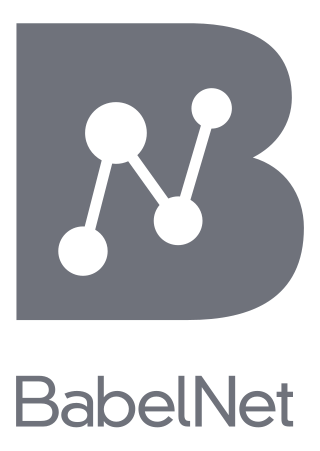Computational linguistics is an interdisciplinary field concerned with the computational modelling of natural language, as well as the study of appropriate computational approaches to linguistic questions. In general, computational linguistics draws upon linguistics, computer science, artificial intelligence, mathematics, logic, philosophy, cognitive science, cognitive psychology, psycholinguistics, anthropology and neuroscience, among others.
Word-sense disambiguation (WSD) is the process of identifying which sense of a word is meant in a sentence or other segment of context. In human language processing and cognition, it is usually subconscious/automatic but can often come to conscious attention when ambiguity impairs clarity of communication, given the pervasive polysemy in natural language. In computational linguistics, it is an open problem that affects other computer-related writing, such as discourse, improving relevance of search engines, anaphora resolution, coherence, and inference.

The Association for Computational Linguistics (ACL) is a scientific and professional organization for people working on natural language processing. Its namesake conference is one of the primary high impact conferences for natural language processing research, along with EMNLP. The conference is held each summer in locations where significant computational linguistics research is carried out.
A paraphrase or rephrase is the rendering of the same text in different words without losing the meaning of the text itself. More often than not, a paraphrased text can convey its meaning better than the original words. In other words, it is a copy of the text in meaning, but which is different from the original. For example, when someone tells a story they heard in their own words, they paraphrase, with the meaning being the same. The term itself is derived via Latin paraphrasis, from Ancient Greek παράφρασις (paráphrasis) 'additional manner of expression'. The act of paraphrasing is also called paraphrasis.

Punta Cana is a resort town in the easternmost region of the Dominican Republic. It was politically incorporated as the "Verón–Punta Cana township" in 2006, and it is subject to the municipality of Higüey. According to the 2022 census, this township or district had a population of 138,919 inhabitants.
AFNLP is the organization for coordinating the natural language processing related activities and events in the Asia-Pacific region.
Jun'ichi Tsujii is a Japanese computer scientist specializing in natural language processing and text mining, particularly in the field of biology and bioinformatics.
In statistics and natural language processing, a topic model is a type of statistical model for discovering the abstract "topics" that occur in a collection of documents. Topic modeling is a frequently used text-mining tool for discovery of hidden semantic structures in a text body. Intuitively, given that a document is about a particular topic, one would expect particular words to appear in the document more or less frequently: "dog" and "bone" will appear more often in documents about dogs, "cat" and "meow" will appear in documents about cats, and "the" and "is" will appear approximately equally in both. A document typically concerns multiple topics in different proportions; thus, in a document that is 10% about cats and 90% about dogs, there would probably be about 9 times more dog words than cat words. The "topics" produced by topic modeling techniques are clusters of similar words. A topic model captures this intuition in a mathematical framework, which allows examining a set of documents and discovering, based on the statistics of the words in each, what the topics might be and what each document's balance of topics is.
Dragomir R. Radev was an American computer scientist who was a professor at Yale University, working on natural language processing and information retrieval. He also served as a University of Michigan computer science professor and Columbia University computer science adjunct professor, as well as a Member of the Advisory Board of Lawyaw.
In natural language processing, textual entailment (TE), also known as natural language inference (NLI), is a directional relation between text fragments. The relation holds whenever the truth of one text fragment follows from another text.
Lauri Juhani Karttunen was an adjunct professor in linguistics at Stanford and an ACL Fellow. He died in 2022.

BabelNet is a multilingual lexicalized semantic network and ontology developed at the NLP group of the Sapienza University of Rome. BabelNet was automatically created by linking Wikipedia to the most popular computational lexicon of the English language, WordNet. The integration is done using an automatic mapping and by filling in lexical gaps in resource-poor languages by using statistical machine translation. The result is an encyclopedic dictionary that provides concepts and named entities lexicalized in many languages and connected with large amounts of semantic relations. Additional lexicalizations and definitions are added by linking to free-license wordnets, OmegaWiki, the English Wiktionary, Wikidata, FrameNet, VerbNet and others. Similarly to WordNet, BabelNet groups words in different languages into sets of synonyms, called Babel synsets. For each Babel synset, BabelNet provides short definitions in many languages harvested from both WordNet and Wikipedia.
In natural language processing (NLP), a word embedding is a representation of a word. The embedding is used in text analysis. Typically, the representation is a real-valued vector that encodes the meaning of the word in such a way that the words that are closer in the vector space are expected to be similar in meaning. Word embeddings can be obtained using language modeling and feature learning techniques, where words or phrases from the vocabulary are mapped to vectors of real numbers.
A confusion network is a natural language processing method that combines outputs from multiple automatic speech recognition or machine translation systems. Confusion networks are simple linear directed acyclic graphs with the property that each a path from the start node to the end node goes through all the other nodes. The set of words represented by edges between two nodes is called a confusion set. In machine translation, the defining characteristic of confusion networks is that they allow multiple ambiguous inputs, deferring committal translation decisions until later stages of processing. This approach is used in the open source machine translation software Moses and the proprietary translation API in IBM Bluemix Watson.
Paraphrase or paraphrasing in computational linguistics is the natural language processing task of detecting and generating paraphrases. Applications of paraphrasing are varied including information retrieval, question answering, text summarization, and plagiarism detection. Paraphrasing is also useful in the evaluation of machine translation, as well as semantic parsing and generation of new samples to expand existing corpora.
Mirella Lapata FRSE is a computer scientist and Professor in the School of Informatics at the University of Edinburgh. Working on the general problem of extracting semantic information from large bodies of text, Lapata develops computer algorithms and models in the field of natural language processing (NLP).
Bidirectional Encoder Representations from Transformers (BERT) is a language model based on the transformer architecture, notable for its dramatic improvement over previous state of the art models. It was introduced in October 2018 by researchers at Google. A 2020 literature survey concluded that "in a little over a year, BERT has become a ubiquitous baseline in Natural Language Processing (NLP) experiments counting over 150 research publications analyzing and improving the model."
Mona Talat Diab is a computer science professor and director of Carnegie Mellon University's Language Technologies Institute. Previously, she was a professor at George Washington University and a research scientist with Facebook AI. Her research focuses on natural language processing, computational linguistics, cross lingual/multilingual processing, computational socio-pragmatics, Arabic language processing, and applied machine learning.
Ellen Riloff is an American computer scientist currently serving as a professor at the School of Computing at the University of Utah. Her research focuses on natural language processing and computational linguistics, specifically information extraction, sentiment analysis, semantic class induction, and bootstrapping methods that learn from unannotated texts.

deepset is an enterprise software vendor that provides developers with the tools to build production-ready natural language processing (NLP) systems. It was founded in 2018 in Berlin by Milos Rusic, Malte Pietsch, and Timo Möller. deepset authored and maintains the open source software Haystack and its commercial SaaS offering deepset Cloud.
 EMNLP 2024, Miami, Florida, United States
EMNLP 2024, Miami, Florida, United States  EMNLP 2023, Singapore
EMNLP 2023, Singapore  EMNLP 2022, [4] Abu Dhabi, United Arab Emirates (Hybrid)
EMNLP 2022, [4] Abu Dhabi, United Arab Emirates (Hybrid) EMNLP 2021, Punta Cana, Dominican Republic or online
EMNLP 2021, Punta Cana, Dominican Republic or online EMNLP 2020, Punta Cana, Dominican Republic (virtual conference due to COVID-19)
EMNLP 2020, Punta Cana, Dominican Republic (virtual conference due to COVID-19) EMNLP 2019, Hong Kong, China
EMNLP 2019, Hong Kong, China  EMNLP 2018, Brussels, Belgium
EMNLP 2018, Brussels, Belgium  EMNLP 2017, Copenhagen, Denmark
EMNLP 2017, Copenhagen, Denmark  EMNLP 2016, Austin, Texas, United States
EMNLP 2016, Austin, Texas, United States  EMNLP 2015, Lisbon, Portugal
EMNLP 2015, Lisbon, Portugal  EMNLP 2014, Doha, Qatar
EMNLP 2014, Doha, Qatar  EMNLP 2013, Seattle, Washington, United States
EMNLP 2013, Seattle, Washington, United States  EMNLP 2012, Jeju Island, South Korea
EMNLP 2012, Jeju Island, South Korea  EMNLP 2011, Edinburgh, United Kingdom
EMNLP 2011, Edinburgh, United Kingdom  EMNLP 2010, Cambridge, Massachusetts, United States
EMNLP 2010, Cambridge, Massachusetts, United States  EMNLP 2009, Singapore
EMNLP 2009, Singapore  EMNLP 2008, Honolulu, Hawaii, United States
EMNLP 2008, Honolulu, Hawaii, United States  EMNLP 2007, Prague, Czech Republic
EMNLP 2007, Prague, Czech Republic  EMNLP 2006, Sydney, Australia
EMNLP 2006, Sydney, Australia 


